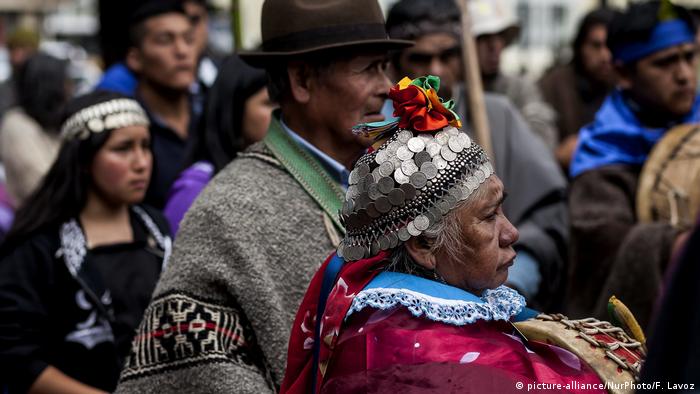The EU is currently negotiating several free trade agreements, including with Chile. Actually, to be aligned with the Convention Standards. However, citizens ‘ movements in Chile warn of negative consequences for the environment.

Chile’s Capital, Santiago
Avocados, salmon, wine and copper are some of the products exported by Chile to the European Union. Also Lithium, which is needed for the production of electric cars, launches in foreign countries of interest.
For Chile, trade with the EU accounts for 14 percent of total trade. The EU is the third largest trading partner, after China and the United States.
While Chile exported mostly raw materials in the EU, buy it from Europe, especially vehicles, machinery, electronics and chemical products – in the past year to 8.8 billion euros.
The EU is also Chile’s largest Investor. A new free trade agreement to deepen the trade relations soon.
A political sign
Chile belongs to the countries with the largest number of free trade and investment agreement, currently, there are 25. Negotiations are underway with China, Brazil, South Korea and the EU.
The talks with the Europeans are turning to the modernization of the Association agreement, which already exists since 2003.
According to the global agreement with Mexico, which came into force in 2000, Chile was the first Latin American country with which the EU completed an Association agreement.

Felipe Lopeandía negotiated for Chile with the EU
So far there have been two rounds of negotiations, the next is the end of the year.
The goal is a new, more modern free-trade agreement to sign, explained the Chilean negotiators Felipe Lopeandía.
“With negotiations such as this, we want to put a political sign,” he says. “It is important with the deepening of the free trade protectionist pressures. This strategy promises more prosperity, more jobs and more sustainable economic development.”
The new agreement is intended to dismantle customs barriers, the mutual market access for Goods and services as well as investment conditions improve, protect intellectual property and dispute settlement rules.
“Not a neo-colonial relationship with Europe”
In Chile, there are also opponents of the proposed agreement, the fear of negative consequences. “In order to protect their investments, restrict the European company, our sovereignty,” said Lucía Sepúlveda, spokesperson for the citizens ‘ movement “Chile Mejor sin TLC” (in German: “Chile is better off without free trade agreements”).
“Environmental protection can be interpreted as a trade barrier and Chile before an international arbitration court to sue. We do not want a neo-colonial relationship with Europe. The EU wants us to sell your machines and we will continue to deliver raw materials,” says Sepúlveda.
Rather than to promote the economic diversity and the Chilean industry that would strengthen the agreement the concentration on mining and agriculture, she says. The Chapter on the protection of intellectual property from the targets in addition to the fact that in Chile the privatisation of seed varieties.

Members of the indigenous ethnic group of the Mapuche in the southern Chilean city of Temuco
The protection of the indigenous population
Concern also of the European investment in the Chilean energy sector, which should rise as a result of the agreement. Often large projects are carried out by foreign companies in Chile, without the consent of the local, often indigenous population.
So the Spanish company ENDESA, 2002 built, for example, the Ralco dam in southern Chile, against considerable resistance of the local Mapuche population.
For the flooding of the reservoir, members of the indigenous peoples had to be resettled.
In 2006, the environmental activist Macarena Valdés came under dubious circumstances, killed as she campaigned against the construction of a hydroelectric power plant of the Austrian company RP Global in their municipality of Panguipulli.
“For us, these cases are examples of the negative consequences of free trade, causing a Power asymmetry. The transnational companies have the Power and no one is interested in the local population and the environment,” says Sepúlveda.
Consumer, bees and biodiversity
María Elena Rozas, works for the “Pesticide Action Network” in Chile. She fears that the free trade agreement with the EU, the Import of toxic plant protection products will increase to Chile.
“We try in Chile for years to toxic plant protection product ban. But the lobbying of the large companies is stronger. The corporations will make the free trade agreement more profit. The losers of the Chilean consumer, the bees and the biodiversity,” says Rozas.
Especially, the merger of Bayer and Monsanto, the largest agrochemical company in the world prepares you. Figures from the FAO, the food and agriculture organization of the United Nations, show that the Import of plant protection products has risen to Chile in the last 20 years has increased by 469 percent.

Years before the Takeover by Bayer, has been demonstrated in Chile against Monsanto – here 2013 in Valparaiso
Banned In the EU, in Chile legal
Many of these pesticides are banned in the EU. One of which is Paraquat, marketed by the Swiss company Syngenta. Under the country of workers and peasants, it always comes back to serious health damage and even deaths, because the toxic agent is used without the necessary protective measures.
In Chile, the Chilean subsidiary of Italian confectionery manufacturer Ferrero is Paraquat used on the Hazelnut plantations of Agrichile,. Chile is the third largest hazelnut producer in the world.
Include plant protection products, which may not or only to a very limited extent be used in Europe, including Fipronil (BASF) and azinphos-methyl (Bayer).
The Activists Sepúlveda and Rozas therefore demand from the Chilean government a comprehensive study of the environmental consequences of the free trade agreement, in addition to more transparency and citizen participation.

